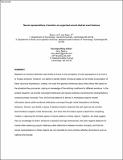| dc.contributor.author | Skerry, Amy E. | |
| dc.contributor.author | Saxe, Rebecca R | |
| dc.date.accessioned | 2017-03-07T19:33:52Z | |
| dc.date.available | 2017-03-07T19:33:52Z | |
| dc.date.issued | 2015-07 | |
| dc.date.submitted | 2015-05 | |
| dc.identifier.issn | 09609822 | |
| dc.identifier.uri | http://hdl.handle.net/1721.1/107225 | |
| dc.description.abstract | Research on emotion attribution has tended to focus on the perception of overt expressions of at most five or six basic emotions. However, our ability to identify others’ emotional states is not limited to perception of these canonical expressions. Instead, we make fine-grained inferences about what others feel based on the situations they encounter, relying on knowledge of the eliciting conditions for different emotions. In the present research, we provide convergent behavioral and neural evidence concerning the representations underlying these concepts. First, we find that patterns of activity in mentalizing regions contain information about subtle emotional distinctions conveyed through verbal descriptions of eliciting situations. Second, we identify a space of abstract situation features that well captures the emotion discriminations subjects make behaviorally and show that this feature space outperforms competing models in capturing the similarity space of neural patterns in these regions. Together, the data suggest that our knowledge of others’ emotions is abstract and high dimensional, that brain regions selective for mental state reasoning support relatively subtle distinctions between emotion concepts, and that the neural representations in these regions are not reducible to more primitive affective dimensions such as valence and arousal. | en_US |
| dc.description.sponsorship | National Science Foundation (U.S.) (National Science Foundation Graduate Research Fellowship) | en_US |
| dc.description.sponsorship | National Institutes of Health (U.S.) (NIH Grant 1R01 MH096914-01A1) | en_US |
| dc.language.iso | en_US | |
| dc.publisher | Elsevier B.V. | en_US |
| dc.relation.isversionof | http://dx.doi.org/10.1016/j.cub.2015.06.009 | en_US |
| dc.rights | Creative Commons Attribution-NonCommercial-NoDerivs License | en_US |
| dc.rights.uri | http://creativecommons.org/licenses/by-nc-nd/4.0/ | en_US |
| dc.source | Prof. Saxe via Courtney Crummett | en_US |
| dc.title | Neural Representations of Emotion Are Organized around Abstract Event Features | en_US |
| dc.type | Article | en_US |
| dc.identifier.citation | Skerry, Amy E., and Rebecca Saxe. "Neural Representations of Emotion Are Organized around Abstract Event Features." Current Biology 25 (August 3, 2015), pp.1945-1954. | en_US |
| dc.contributor.department | Massachusetts Institute of Technology. Department of Brain and Cognitive Sciences | en_US |
| dc.contributor.approver | Saxe, Rebecca R | en_US |
| dc.contributor.mitauthor | Saxe, Rebecca R | |
| dc.relation.journal | Current Biology | en_US |
| dc.eprint.version | Original manuscript | en_US |
| dc.type.uri | http://purl.org/eprint/type/JournalArticle | en_US |
| eprint.status | http://purl.org/eprint/status/PeerReviewed | en_US |
| dspace.orderedauthors | Skerry, Amy E.; Saxe, Rebecca | en_US |
| dspace.embargo.terms | N | en_US |
| dc.identifier.orcid | https://orcid.org/0000-0003-2377-1791 | |
| mit.license | PUBLISHER_CC | en_US |
